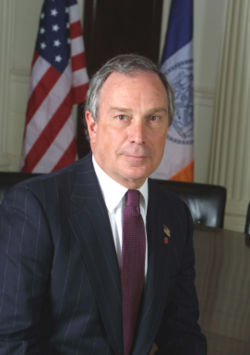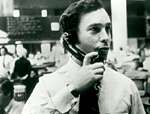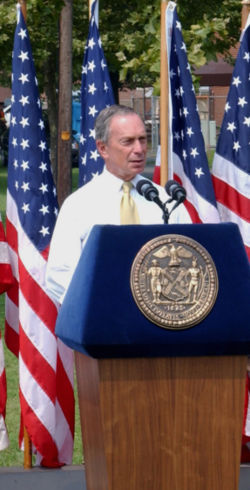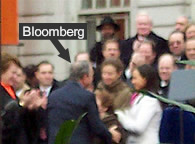Michael Bloomberg 

Michael Rubens "Mike" Bloomberg (born February 14, 1942), a Republican, is a prominent American businessman, the founder of Bloomberg L.P., and the current Mayor of the City of New York. Although a Republican in a largely socially liberal city, the Mayor has gained blocs of support from people of all political beliefs and has become one of the first city mayors to campaign for the lifting of same-sex marriage bans.
Personal life and business career

Michael Bloomberg on Wall Street.Bloomberg was born and raised in a Jewish-American family in Medford, Massachusetts, a Boston suburb. He is an Eagle Scout. He attended Johns Hopkins University, where he joined Phi Kappa Psi, and graduated in 1964 with a B.S. degree in electrical engineering. Later he received his MBA degree from Harvard Business School.
Bloomberg was a general partner at Salomon Brothers, where he headed equity trading, sales and, later, systems development. He made his fortune with his own company, Bloomberg L.P., selling financial information terminals to Wall Street firms; the company also began a radio network (the flagship station is 1130 WBBR-AM in New York City).
Bloomberg is among the world's richest people. He was ranked no. 34 by Forbes magazine in its list of 400 Richest Americans in September 2004. He was ranked no. 94 in the Forbes List of the 500 Richest People in the World in March 2005.
Forbes and other sources report his net worth at US$5 billion, which, in addition to furthering his political career, has allowed him to engage in substantial philanthropy, including donating over US$200 million to Johns Hopkins University, where he served as the chairman of the board from 1996 to 2002.
His daughters by former wife, British-born Susan Brown, are Georgina Bloomberg (who has been featured on Born Rich, a documentary film about the children of the extremely wealthy) and Emma Bloomberg. His younger sister, Marjorie Tiven, is Commissioner of the New York City Commission for the United Nations, Consular Corps and Protocol. His mother, Charlotte Bloomberg, is still alive, in her nineties, and reported to be in good health. His current girlfriend is state banking superintendent, Diana Taylor.
He has written an autobiography, Bloomberg by Bloomberg (1997, ISBN 0471155454).
Bloomberg does not reside in Gracie Mansion, the official mayor's mansion, but at his own home elsewhere on the Upper East Side (79th Street between Madison and Fifth avenues). He maintains his home address in the white pages and is known to ride the subway to City Hall every morning, even during periods of heightened terrorist alert against the subway system.
2001 election
In 2001 the incumbent mayor, Rudy Giuliani, was prevented by term limits from running for re-election. Several well-known New York City politicians aspired to succeed him. Bloomberg, a lifelong member of the Democratic Party, decided to run for mayor as a member of the Republican Party, reportedly to avoid the crowded field in the Democratic primary.
Voting in the primary began on the morning of September 11. Later that day, however, because of the disruption caused by the attacks on the World Trade Center, the voting was canceled and the primary postponed. In the rescheduled primary, Bloomberg defeated Herman Badillo, a former Congressman, to become the Republican nominee. The Democratic primary did not produce a first-round winner. There was a runoff, in which the nomination went to New York City Public Advocate Mark J. Green.
In the general election, Bloomberg had Giuliani's endorsement. He also enjoyed a huge spending advantage. New York City's campaign finance law restricted the contributions a candidate could accept, but Bloomberg exercised his right to opt out of this law, though this also attracted some criticism. He spent some $73 million of his own money on his campaign, outspending Green by five to one. One of the major themes of his campaign was that, with the city's economy suffering from the effects of the attacks, it needed a mayor with business experience.
In addition to being the Republican nominee, Bloomberg had the ballot line of the Independence Party. The latter proved to be important, as Bloomberg's votes on that line exceeded his margin of victory over Green. (Under New York's fusion rules, a candidate can run on more than one party's line and cumulate all the votes received on all lines. Green, the Democrat, also had the ballot line of the Working Families Party.) Bloomberg won by 50% to 48%. (See Election results for mayor of New York for complete totals.)
Bloomberg declined the mayor's salary, accepting remuneration of $1.00 annually. He is considered a liberal Republican, who is pro-choice, in favor of legalizing same-sex marriage and an advocate for stricter gun control laws.
Policies

Bloomberg giving a speech in August 2004.
Managerial style
In sharp contrast to the tight central control and preference for the appointment of political appointees favored by the previous Giuliani administration, Bloomberg has chosen to apply a statistical results-based approach to city management, appointing city commissioners based on expertise and only loosely overseeing their policies. In addition, breaking with 190 years of tradition, Bloomberg implemented a "bullpen" open office plan, seating dozens of aides and managerial staff in a large chamber, reminiscent of a Wall St. trading floor - this was designed to promote accountability and accessibility.
On January 30, 2006, Bloomberg fired Edward Greenwood IX, employed as an assistant in the city's lobbying office in Albany, after finding him playing solitaire on a computer in his office. "The workplace is not an appropriate place for games," Bloomberg said. "It's a place where you've got to do the job that you're getting paid for." (See also: Austin M. Allran and .)
Education and social policy
His mayoralty coincides with an increase in the mayor's authority over and accountability for the city's public schools. From 1968 through 2000, the schools were run by 25 local school boards who were elected, and overall management was the responsibility of a Board of Education composed by 7 members, two of which were appointed by the mayor. The local boards and Board of Education were abolished and replaced with a mayoral agency, the Department of Education. To head this department, he appointed Joel Klein as Chancellor, and based him out of the Tweed Courthouse near City Hall. During their time in office test scores rose and they have obtained a higher percentage of funding from the state budget. Bloomberg opposes social promotion, and favors after-school and summer school programs to help schoolchildren catch up rather than allowing them to advance to the next grade level unprepared. Despite often tense relations with teachers' unions, he avoided a teacher strike by concluding a contract negotiation in which teachers received an average raise of 15% in exchange for givebacks and productivity increases.
Bloomberg supports the legalization of same-sex marriage in New York, though he has appealed a decision finding the limiting of same-sex marriage unconstitutional because he has stated he wants to ensure it is permitted under New York State law: "My personal opinion is that anybody should be allowed to marry anybody. I don't happen to think we should put restrictions on who you should marry.... What the city doesn't want to have happen is people getting a marriage license and then six months, or one year later, or two years later, finding out it's meaningless."
He supported extending the city's smoking ban to all commercial establishments, removing the last indoor public areas where one could smoke in the city: bars and nightclubs. The smoking ban took effect in March 2003 and was still being enforced as of 2005.
Crime and security
Under his term, the reduction of crime that started under Mayor David Dinkins has continued. Bloomberg's approach to the issue has been more low-key than that of Giuliani, who was often criticized by advocates for the homeless and civil rights groups.
Since 2003, Bloomberg has become increasingly assertive in demanding that federal homeland security funds be distributed to municipalities based on risk and population rather than any other measure.
Gun Control
Bloomberg is a strong advocate of gun control and made it a major issue of his administration in his second inaugural address.
City services
Bloomberg, the founder of an information services company, has tried to better citizen access to city information services.
Perhaps Bloomberg's single most popular program has been the establishment of a 311 telephone line (an idea first implemented in Baltimore, Maryland). Dialing 311 puts the caller in contact with the city, allowing them to report any crimes, annoyances, trash problems, etc. It also can be used for question-answer purposes. Bloomberg has also pushed the development of NYCTV and the revitalization of www.nyc.gov, the official city website.
There has been some opposition from community groups to Bloomberg's plan to open a new waste transfer station in an affluent residential area on the Upper East Side - the intention being to make the distribution of waste storage sites more equitable and to reduce garbage truck traffic, and the criticism being based on concerns for property values and neighborhood quality of life.
In June 2005 Bloomberg signed the Potty Parity bill requiring more women's toilets in newly opened public places such as bars, theaters, stadiums and convention facilities.
Local 100 of the Transport Workers Union went on strike December 20, 2005 forcing a shutdown of the city's bus and subway service. The transit workers are employed by the Metropolitan Transit Authority and the mayor does not directly control the negotiations. However, the mayor is responsible for coordinating the overall response of the city agencies. Showing solidarity with the people of New York who were inconvenienced by the strike, the Mayor crossed the Brooklyn Bridge on the first day of the strike as Mayor Ed Koch did in the 1980 strike.
Economic policy
In the 2001 campaign, he ran on a "no new taxes" platform and criticized Green for refusing to rule out a tax increase, but during his first year in office, Bloomberg proposed a 25 percent increase in the property tax. The City Council approved an increase of 18.5 percent. This was the largest property tax increase in city history.
He was the most visible proponent of the failed New York City 2012 Olympic bid and planned accompanying West Side Stadium, which he had hoped would help extend Midtown westward to the Hudson River. This plan met opposition from neighborhood residents, and was then rejected by Albany government leaders who felt they had not been sufficiently consulted. He has also been a major supporter of the Brooklyn Nets Arena, controversial among other reasons for the planned use of eminent domain to support private development. Generally, Bloomberg's development plans have been criticized by opponents for a perceived top-down approach. He also supports a plan for a new Mets Stadium stadium and a new Yankee Stadium. Despite the support of the Bronx Borough President, Adolpho Carrion, the proposal for the new Yankee Stadium has encountered significant community opposition.
Immigration
He is a supporter of immigration reform to secure the rights of illegal aliens, who comprise a large part of the population of New York City. He argues that deportation breaks up families and scares illegal aliens away from cooperating with law enforcement or accessing vital social services; as such, he supports proposals like those put forth by U.S. Senators Ted Kennedy and John McCain, which would normalize the status of otherwise law-abiding illegal aliens already present.
Relationship to the Republican Party
While he was mayor, New York City hosted the 2004 Republican National Convention, to the opposition of many locals who felt it was inappropriate during the Iraq War. He was particularly criticized for his handling of protest activity, with hundreds being detained at a former bus garage on Pier 57 characterized by opponents as a "Guantanamo on the Hudson".

Bloomberg seconds after being sworn in for 2nd term as Mayor of New York City on January 1, 2006.

Michael Bloomberg and his current girlfriend, Diana Taylor, at the 2006 Time 100 gala, as covered by vlog Rocketboom.Bloomberg was re-elected mayor in November 2005 by a margin of 20%, the widest margin ever for a Republican mayor of New York (Bloomberg 58.5%, Fernando Ferrer 38.7%).
Bloomberg had spent over $66 million on his campaign by late October 2005, and was projected to exceed the record of $74 million he spent on the previous election. He chose not to use public campaign funds and therefore his campaign was not subject to the restrictions imposed on candidates who accept such funding.
In late 2004 or early 2005, he gave the Independence Party $250,000 to fund a phone bank seeking to recruit volunteers for his re-election campaign.
Former Bronx Borough President Fernando Ferrer won the Democratic nomination to oppose Bloomberg in the general election; there was no opposition in the Republican primary, as Bloomberg's campaign successfully sued to keep Thomas Ognibene off of the ballot. Ognibene, who ultimately ran on the Conservative Party ticket, accuses Bloomberg of betraying Republican Party ideals.
Bloomberg was the most prominent Republican to oppose the successful confirmation of John Roberts as Chief Justice of the United States. Though a Republican, Bloomberg is a staunch supporter of abortion rights and did not believe that Roberts was committed to maintaining Roe v. Wade.
Besides Republican support, Bloomberg had obtained the endorsements of several prominent Democrats: former Mayor Ed Koch (who in recent years has supported many Republicans, including George W. Bush), former governor Hugh Carey, former City Council Speaker Peter Vallone, his son, Councilman Peter Vallone, Jr., former Congressman Floyd Flake (who had previously endorsed Bloomberg in 2001), and Brooklyn Borough President Marty Markowitz.
Bloomberg's term as mayor ends on December 31, 2009. He is barred by term limits from running again. The election means that the Republicans have held onto the mayor's office for four consecutive elections, or 16 years. Bloomberg joins Rudy Giuliani and Fiorello LaGuardia as re-elected Republican mayors in this mostly Democratic city. (John Lindsay was also elected mayor of New York twice while a registered Republican; however, Lindsay did not receive the Republican Party nomination during his campaign for re-election, and he switched to the Democratic Party during his second term.)
One of Bloomberg's top aides, Kevin Sheekey, has indicated that Bloomberg is considering running for President in 2008 as an Independent or a Democrat.
Bloomberg has pledged his support to the LGBT community to support marriage equality.

